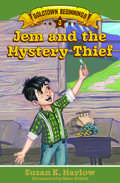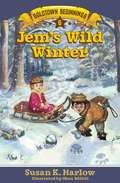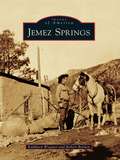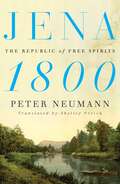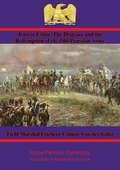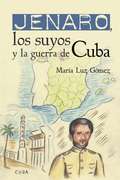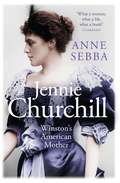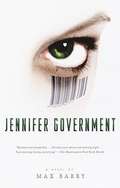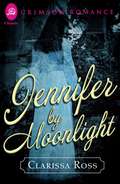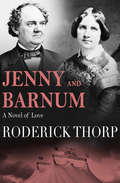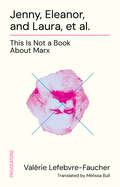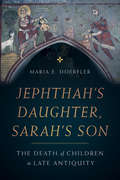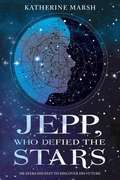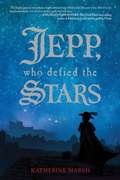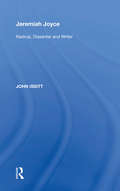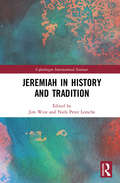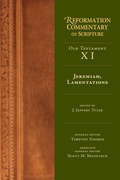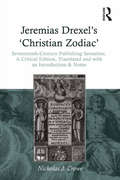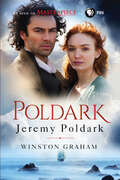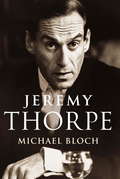- Table View
- List View
Jem and the Mystery Thief (Goldtown Beginnings #3)
by Susan K. MarlowJem can't wait for school to let out for the year. Is there anything more boring than class when you could be outside? When rich boy Will brings a coin collection to school, it's an exciting treat. It isn't often the students get to see all that interesting money in one place.Then a silver dollar goes missing during recess--and Jem is blamed! After all, he's the only one who went indoors on this sunny day. When a charm bracelet is stolen the next day, more fingers point his way.Jem knows he isn't the culprit. But how can he prove it? To clear his name, Jem sets a trap for the mystery thief--his sister's gold locket lays in plain sight on his desk as bait. Will it go missing too? Or will Jem's good name be muddied forever?
Jem's Wild Winter (Goldtown Beginnings #6)
by Susan K. MarlowThere’s never been a winter like this in all of Jem Coulter's eight years. After weeks of heavy snowfall, no one can pan for gold. And all the wild critters from rabbits to cougars are coming down to the low country around Goldtown looking for food to stay alive. It isn't all bad, though--animals mean Pa can put out a trapline to make some money for the family. Jem is excited to help with this grownup job, until their overnight campsite in the wintery woods has an unexpected visitor. Now they're in the most danger Jem's ever faced!
Jemez Springs
by Robert Borden Kathleen WiegnerIn 1849, James Hervy Simpson, a lieutenant and engineer in the Army Corps of Topographical Engineers, was ordered to survey a wagon road as a southern alternative to the Santa Fe Trail from Fort Smith, Arkansas, to Santa Fe, New Mexico. Simpson hired two brothers, Edward "Ned" and Richard Kern, to provide survey sketches that included the pueblo ruins of Giusewa and natural hot springs of Ojo Caliente, which are known today as Jemez Springs. Prior to incorporation in 1955, Jemez Springs, like many frontier towns, was supported by ranching, logging, and mining. It also had an influx of tourists who enjoyed the hot springs or one of the many dude ranches in the area. In 1995, Jemez Springs won an award as an All-America City from the National Civic League, and with a mere 375 residents at the time, it was one of the smallest communities to earn the honor.
Jena 1800: The Republic of Free Spirits
by Peter Neumann“An exhilarating account of a remarkable historical moment, in which characters known to many of us as immutable icons are rendered as vital, passionate, fallible beings . . . Lively, precise, and accessible.” —Claire Messud, Harper’sAround the turn of the nineteenth century, a steady stream of young German poets and thinkers coursed to the town of Jena to make history. The French Revolution and the Napoleonic Wars had dealt a one-two punch to the dynastic system. Confidence in traditional social, political, and religious norms had been replaced by a profound uncertainty that was as terrifying for some as it was exhilarating for others. Nowhere was the excitement more palpable than among the extraordinary group of poets, philosophers, translators, and socialites who gathered in this Thuringian village of just four thousand residents.Jena became the place for the young and intellectually curious, the site of a new departure, of philosophical disruption. Influenced by Johann Wolfgang von Goethe, then an elder statesman and artistic eminence, the leading figures among the disruptors—the translator August Wilhelm Schlegel; the philosophers Friedrich "Fritz" Schlegel and Friedrich Schelling; the dazzling, controversial intellectual Caroline Schlegel, married to August; Dorothea Schlegel, a poet and translator, married to Fritz; and the poets Ludwig Tieck and Novalis—resolved to rethink the world, to establish a republic of free spirits. They didn’t just question inherited societal traditions; with their provocative views of the individual and of nature, they revolutionized our understanding of freedom and reality.With wit and elegance, Peter Neumann brings this remarkable circle of friends and rivals to life in Jena 1800, a work of intellectual history that is colorful and passionate, informative and intimate—as fresh and full of surprises as its subjects.
Jena to Eylau: The Disgrace and the Redemption of the Old-Prussian Army
by C. F. Atkinson Field Marshal Freiherr Colmar Von der GoltzThis ebook is purpose built and is proof-read and re-type set from the original to provide an outstanding experience of reflowing text for an ebook reader. Field-Marshal Von der Goltz was one of the most widely read military authors of the late 19th century; his ideas and theories of the "Nation in Arms" were to be brought into practice during the First World War, during which he served. His wide military experience ranged from the practical during the 1866 Bohemian campaign to the Franco-Prussian war of 1870-71, before moving on to staff and teaching posts. He authored many works during his time as part of the historical section of the Prussian General Staff, mostly about the theory of war and the victorious campaigns of the 1870-71. A fiercely patriotic man, he was inspired to write about the great defeat of the Prussian army of 1806 as part history and part catharsis. His work is supremely detailed and his great critical military mind avoids bias in favour of the Prussians. This title is acclaimed as a military classic along with his "Von Rossbach bis Jena und Auerstädt" and "Nation in Arms". Title - Jena to Eylau Sub-Title - The Disgrace and the Redemption of the Old-Prussian Army Author -- Field Marshal Freiherr Colmar Von der Goltz (1843-1916) Translator -- C. F. Atkinson (????-????) Text taken, whole and complete, from the edition published in 1913, London, by Kegan Paul, Trench, Trübner & Co. Ltd. Original - xv and 340 pages. Illustrations - The maps cannot be reproduced with this volume as they are A3.
Jenaro, los suyos y la guerra de Cuba
by María Luz GómezBiografía histórica en la trepidante época de la España del siglo XIX. Libro familiar e histórico. Trata de un militar que luchó en la guerra de Cuba, y en la Revolución «Gloriosa» española, y de su entorno familiar. <P><P>Relata la vida de Jenaro Roldán del nacimiento a la muerte, con los avatares nacionales de su época, históricos y familiares. Y se completa con algunas noticias de los suyos tras su fallecimiento.
Jennie Churchill: Winston's American Mother
by Anne SebbaJennie Churchill was said to have had two hundred lovers, three of whom she married. But her love for her son Winston never wavered. Jennie Churchill is an intimate picture of her glittering but ultimately tragic life, and the powerful mutual infatuation between her and her son. Anyone who wants to understand Winston must start here, with this revelatory interpretation. Anne Sebba has gained unprecedented access to private family correspondence, newly discovered archival material and interviews with Jennie's two surviving granddaughters. She draws a vivid and frank portrait of her subject, repositioning Jennie as a woman who refused to be cowed by her era's customary repression of women.
Jennie Lee, Patriot
by Anne EmeryThis is antebellum Charleston, ante-Revolutionary bellum that is, and it is surprising how closely the situation and the scaffold of the story parallel those of the Civil War. Jennie Lee Lawrence is a plantation owner's daughter when the war reaches Charleston in 1780. The war destroys families and friendships and when the city is occupied, Jennie makes a daring midnight ride to warn her sweetheart who is a Patriot spy. He is also the son of her overseer, an alliance which would not have been possible before the war. On the other hand Jennie's sister marries a Loyalist boy who would previously have been acceptable to the family but now is not. With minor exceptions, the historical progress of the war is rather nebulous; Jennie Lee endures very little; but her story does present a conception of the strain on human relations which such a war brings.
Jennie: The Romantic Years 1854-1895
by Ralph G. MartinHaving spent 30 weeks on the New York Times bestseller list, Ralph Martin's Jennie: The Life of Lady Randolph Churchill is the story of a girl from Brooklyn who became the toast of British society.
Jennifer Government
by Max BarryTaxation has been abolished, the government has been privatized, and employees take the surname of the company they work for. It's a brave new corporate world, but you don't want to be caught without a platinum credit card--as lowly Merchandising Officer Hack Nike is about to find out. Trapped into building street cred for a new line of $2500 sneakers by shooting customers, Hack attracts the barcode-tattooed eye of the legendary Jennifer Government. A stressed-out single mom, corporate watchdog, and government agent who has to rustle up funding before she's allowed to fight crime, Jennifer Government is holding a closing down sale--and everything must go. A wickedly satirical and outrageous thriller about globalization and marketing hype, Jennifer Government is the best novel in the world ever.From the Trade Paperback edition.
Jennifer Government: A Novel
by Max BarryIn the future, the world will be run by giant American corporations, Everybody will be so happy, tax-free and rich that they will change their name to that of their company. Hack Nike, however, is a lowly Merchandising Officer with negative career equity. In the future, this is not a good thing. So when John Nike and John Nike offer Hack Nike a job marketing a new line of really, really expensive trainers he is understandably thrilled. He is less thrilled when he discovers that his duties include shooting teenagers.
Jennifer by Moonlight
by Clarissa RossAs Crimson Romance celebrates its first anniversary, we honor those pioneers who helped shape the direction of romance novels for all of us. Suspense, mystery, paranormal activity and love - always love - have been the cornerstone of the genre since the early 1970s. Now we have updated the covers to these classics - but not the words - and reissued these timeless reads to let you relive the thrill of discovering a world of romance all over again.Lucy Dorset came to Moorgate as the happy bride of a dedicated young doctor. But she soon discovered that the old stone house was inhabited by a pale and lovely ghost, a victim of a fatal romantic triangle long ago. Was she imagining her husband's sudden jealous moods? And a rival for his affections in sultry Sheila Farley? Lucy feared that the unhappy spirits of Moorgate were pushing her toward a reenactment of a violent, century-old tragedy. She realized that she alone must rid the house of the menacing presence that threatened her marriage.Sensuality Level: Behind Closed Doors
Jennifer by Moonlight
by Clarissa RossAs Crimson Romance celebrates its first anniversary, we honor those pioneers who helped shape the direction of romance novels for all of us. Suspense, mystery, paranormal activity and love - always love - have been the cornerstone of the genre since the early 1970s. Now we have updated the covers to these classics - but not the words - and reissued these timeless reads to let you relive the thrill of discovering a world of romance all over again.Lucy Dorset came to Moorgate as the happy bride of a dedicated young doctor. But she soon discovered that the old stone house was inhabited by a pale and lovely ghost, a victim of a fatal romantic triangle long ago. Was she imagining her husband’s sudden jealous moods? And a rival for his affections in sultry Sheila Farley? Lucy feared that the unhappy spirits of Moorgate were pushing her toward a reenactment of a violent, century-old tragedy. She realized that she alone must rid the house of the menacing presence that threatened her marriage.Sensuality Level: Behind Closed Doors
Jennifer by Moonlight
by Clarissa RossAs Crimson Romance celebrates its first anniversary, we honor those pioneers who helped shape the direction of romance novels for all of us. Suspense, mystery, paranormal activity and love - always love - have been the cornerstone of the genre since the early 1970s. Now we have updated the covers to these classics - but not the words - and reissued these timeless reads to let you relive the thrill of discovering a world of romance all over again.Lucy Dorset came to Moorgate as the happy bride of a dedicated young doctor. But she soon discovered that the old stone house was inhabited by a pale and lovely ghost, a victim of a fatal romantic triangle long ago. Was she imagining her husband’s sudden jealous moods? And a rival for his affections in sultry Sheila Farley? Lucy feared that the unhappy spirits of Moorgate were pushing her toward a reenactment of a violent, century-old tragedy. She realized that she alone must rid the house of the menacing presence that threatened her marriage.Sensuality Level: Behind Closed Doors
Jenny and Barnum: A Novel of Love
by Roderick ThorpA diva and a showman work together to make history, finding romance along the way After Queen Victoria, Jenny Lind is the most famous woman in Europe. A Swedish soprano with a voice like an angel&’s and a temperament to match, she is in Vienna when she meets the shortest man she has ever seen. General Tom Thumb is a three-foot-tall sensation whom P. T. Barnum has made one of the wealthiest men in the world. Thumb arrives with a message from Barnum offering Lind more money than she has ever dreamed of, to do something she has never done before: perform in America. While Lind makes her way across the Atlantic, Barnum, the Great American Showman, whips US audiences into a frenzy. By the time the singer lands in New York, &“Lindomania&” is in full effect. As Lind and Barnum travel the country, they play for packed houses every night. The public loves Lind, but as the tour wears on, P. T. Barnum will come to love her more.
Jenny, Eleanor, and Laura, et al.: This Is Not a Book About Marx
by Valérie Lefebvre-FaucherThis is not a book about Karl Marx. Rather, it is an investigation of the women in his life. Valérie Lefebvre-Faucher follows a labyrinth of historical letters, traces the branches on an intellectual family tree, and untangles a web of correspondence, to reveal forgotten connections and to map out the negative spaces in the literature. What emerges is not the familiar portrait of Karl alone in his frame, but a group photo of the whole Marx gang. Upturning the picture we have of the early days of modern communism, Jenny, Eleanor, and Laura, et al. calls on us to acknowledge that humans think and create together, not alone.
Jephthah’s Daughter, Sarah’s Son: The Death of Children in Late Antiquity (Christianity in Late Antiquity #8)
by Maria E. DoerflerLate antiquity was a perilous time for children, who were often the first victims of economic crisis, war, and disease. They had a one in three chance of dying before their first birthday, with as many as half dying before age ten. Christian writers accordingly sought to speak to the experience of bereavement and to provide cultural scripts for parents who had lost a child. These late ancient writers turned to characters like Eve and Sarah, Job and Jephthah as models for grieving and for confronting or submitting to the divine. Jephthah's Daughter, Sarah’s Son traces the stories these writers crafted and the ways in which they shaped the lived experience of familial bereavement in ancient Christianity. A compelling social history that conveys the emotional lives of people in the late ancient world, Jephthah's Daughter, Sarah's Son is a powerful portrait of mourning that extends beyond antiquity to the present day.
Jepp, Who Defied The Stars
by Katherine MarshFate: Is it written in the stars from the moment we are born? Or is it a bendable thing that we can shape with our own hands? Jepp of Astraveld needs to know. He left his countryside home on the empty promise of a stranger, only to become a captive in a luxurious prison: Coudenberg Palace, the royal court of the Spanish Infanta. Nobody warned Jepp that as a court dwarf, daily injustices would become his seemingly unshakable fate. If the humiliations were his alone, perhaps he could endure them; but it breaks Jepp's heart to see his friend Lia suffer. After Jepp and Lia attempt a daring escape from the palace, Jepp is imprisoned again, alone in a cage. Now, spirited across Europe in a kidnapper's carriage, Jepp fears where his unfortunate stars may lead him. But he can't even begin to imagine the brilliant and eccentric new master-a man devoted to uncovering the secrets of the stars-who awaits him. Or the girl who will help him mend his heart and unearth the long-buried secrets of his past. Masterfully written, grippingly paced, and inspired by real historical characters, Jepp, Who Defied the Stars is the tale of an extraordinary hero and his inspiring quest to become the master of his own destiny.
Jepp, Who Defied the Stars
by Katherine MarshFate: Is it written in the stars from the moment we are born? Or is it a bendable thing that we can shape with our own hands? Jepp of Astraveld needs to know. He left his countryside home on the empty promise of a stranger, only to become a captive in a luxurious prison: Coudenberg Palace, the royal court of the Spanish Infanta. Nobody warned Jepp that as a court dwarf, daily injustices would become his seemingly unshakable fate. If the humiliations were his alone, perhaps he could endure them; but it breaks Jepp's heart to see his friend Lia suffer. After Jepp and Lia attempt a daring escape from the palace, Jepp is imprisoned again, alone in a cage. Now, spirited across Europe in a kidnapper's carriage, Jepp fears where his unfortunate stars may lead him. But he can't even begin to imagine the brilliant and eccentric new master-a man devoted to uncovering the secrets of the stars-who awaits him. Or the girl who will help him mend his heart and unearth the long-buried secrets of his past. Masterfully written, grippingly paced, and inspired by real historical characters, Jepp, Who Defied the Stars is the tale of an extraordinary hero and his inspiring quest to become the master of his own destiny. "This highly unusual story about a highly unusual hero will also feel like your story. Few of us are imprisoned dwarfs, but all of us want to guide our own lives." -- Jonathan Safran Foer, New York Times best-selling author of Extremely Loud and Incredibly Close "Rich, absorbing storytelling-a terrific read in every way." -- Nancy Werlin, National Book Award Finalist and author of Impossible "Delightful characters, unique setting, and lovely prose. This is historical fiction at its best!" -- Ruta Sepetys, New York Times best-selling author of Between Shades of GrayNew York Times Notable Children's Books of 2012The Wall Street Journal Best Children's Books of 2012
Jeremiah Joyce: Radical, Dissenter and Writer (Science, Technology, And Culture, 1700-1945 Ser.)
by John IssittJeremiah Joyce was one of the accused in the famous Treason Trials of 1794 which marked the suppression of radical agitation in Britain for the ensuing twenty years. He was a political radical who imbibed the traditions of the 'commonwealthman' and actively campaigned for a more democratic and representative state. Through the early 1790s he acted as the metropolitan political agent for his patron the Earl of Stanhope and he liased between radical groups whilst also distributing radical literature including Tom Paine's Rights of Man. He was one of the very few artisans at the end of the eighteenth century adopted by the literary and scientific intelligentsia and was unique in training to become a Unitarian minister at the age of 23 after serving a seven-year trade apprenticeship and having worked as a journeyman. This work traces the legacies, traditions and visions of the English Enlightenment as they are expressed through Joyce's life and literary production. It explores the evolution of these traditions against the threatening background of the French revolution and the developing imperatives for education in general, and science education in particular. By tracing the linkages between political, educational, scientific and publishing cultures, it reflects on the issues of late eighteenth century patronage, the literary forms of popular science and the evolution of the metropolitan book trade. In so doing the book recovers the life of a hitherto much neglected science writer and political activist and contributes to the histories of politics, education, science and the developing discipline of book history.
Jeremiah in History and Tradition (Copenhagen International Seminar)
by Jim West Niels Peter LemcheJeremiah in History and Tradition examines aspects of the Book of Jeremiah from a variety of perspectives including historical, textual, redaction, and feminist criticism, as well as the history of its reception. The book looks afresh at the Book of Jeremiah through the lens of intertextuality and reception history in the broadest sense, exploring Jeremiah in its historical context as well as the later history and interpretation of the text, and also reconsidering aspects of the Book of Jeremiah’s traditions. This volume features essays from a unique assembly of scholars, both seasoned and new. It is divided into two parts: "Jeremiah in History", which explores a variety of readings of Jeremiah from the point of view of classical historical criticism; and "Jeremiah in Tradition", which discusses the portraits and use of both the book and the figure of Jeremiah in extra-biblical traditions. Offering challenging new theories, Jeremiah in History and Tradition is invaluable to scholars and students in the field of Biblical Studies. It is a useful resource for anyone working on the interpretation of the biblical text and the readings of the text of Jeremiah throughout history.
Jeremiah, Lamentations (Reformation Commentary on Scripture Series #Ot Volume 11)
by J. Jeffery TylerThe prophetic ministry of Jeremiah, described in the Old Testament books of Jeremiah and Lamentations, took place during a time of chaos and tragedy for the people of Israel: the fall of Jerusalem, the destruction of the temple, and the exile to Babylon. Yet, in the midst of this loss and in hope of the restoration of God's people, Jeremiah is able to declare: "The steadfast love of the Lord never ceases; his mercies never come to an end; they are new every morning; great is your faithfulness" (Lam 3:22-23). Reflecting on these verses, Reformation commentators, who were themselves familiar with the turbulent realities of their own sixteenth century, heard not only hope for the renewal of Israel, but prophetic promise for the coming of the Messiah. Lutheran theologian and pastor Nikolaus Selnecker wrote, "Is not what Jeremiah says immeasurably beautiful, lovely, and consoling? You will think, what is my soul saying to me? That is a strong Amen, when the spirit of the heart knows and can say, 'God hears me, I know it. My heart tells me. I do not doubt God's grace. I am a child of God. He is my father and will help me.'" In this volume of the Reformation Commentary on Scripture, church historian J. Jeffery Tyler guides readers through a diversity of early modern commentary on the books of Jeremiah and Lamentations. Readers will hear from familiar voices and discover lesser-known figures from a variety of theological traditions, including Lutherans, Reformed, Radicals, Anglicans, and Roman Catholics. Drawing upon a variety of resources—including commentaries, sermons, treatises, and confessions—much of which appears here for the first time in English, this volume provides resources for contemporary preachers, enables scholars to better understand the depth and breadth of Reformation commentary, and seeks to help everyone remember that God's mercies never come to an end.
Jeremias Drexel's 'Christian Zodiac': Seventeenth-Century Publishing Sensation. A Critical Edition, Translated and with an Introduction & Notes
by Nicholas J. CroweFirst published in 1622, Jeremias Drexel's 'Zodiacus christianus' (or 'Christian Zodiac') was a remarkable work of religious iconography and spiritual self-help. Raised a Lutheran but converting to Catholicism in his youth, Drexel (1581-1638) was well placed to publish a book that appealed to Protestants as well as Catholics, his 'Zodiac' appearing in multiple reprints, re-editions and translations across Europe during his lifetime and posthumously across the rest of the seventeenth century in an astonishing arc of popularity. The orbit of his readers' catchment was geographically - and denominationally - wide to a conspicuous degree. Drexel was among the most-read authors of that century, a genuine luminary in the culture of the German Baroque, and arguably the most published writer of the period. Offering the first modern translation into English since the early seventeenth century, this critical edition re-acquaints Anglophone audiences with a sample of the spiritual and philosophical writings of a figure whose significant publication record made him a bestseller during his lifetime and for many decades afterwards. As well as addressing issues of spiritual iconography with relation to 'signs of predestination', the book also has much to say about authorship, publishing and the dissemination of ideas. Including a scholarly introduction, full footnotes and an up-to-date bibliography, this new edition does much to help reveal these themes within the complex interconnections between religion, mysticism, iconography and scholarship in early modern Europe.
Jeremy Poldark: A Novel of Cornwall, 1790-1791 (The Poldark Saga #3)
by Winston GrahamNOW A MASTERPIECE™ SERIES ON PBS®The gripping third book of historical fiction in the Poldark Saga following a family of revolutionary characters through romance, struggle, and the promise of new life.Revolutionary war veteran Ross Poldark faces the darkest hour of his life in this third novel of the Poldark Saga. Reeling from the tragic death of a loved one, Poldark vents his grief by urging impoverished locals to salvage the contents of a ship run aground in a storm—an act that demands death by hanging in the eyes of British law.Ross is brought to trial for his involvement, and despite their stormy marriage, Demelza tries to rally support for her husband, to save him and their family.But there are enemies in plenty who would be happy to see Ross convicted, not least of which is George Warleggan, the powerful banker whose personal rivalry with Ross grows ever more intense and threatens to completely destroy the Poldarks.And into this turbulent family saga, Jeremy Poldark, Ross and Demelza's first son, is born...The Poldark series is Winston Graham's masterwork, evoking the historical period and characters like only he can and creating an engrossing romance of rich and poor, loss and love, sure to engage fans of Downton Abbey and Outlander.
Jeremy Thorpe
by Michael Bloch'A revealing, insightful and gripping biography of one of the most extraordinary people ever to lead a British political party' ObserverThe story of Jeremy Thorpe's rapid rise and spectacular fall from grace is one of the most remarkable in British politics. When he became leader of the Liberal Party in 1967 at the age of just thirty-seven, he seemed destined for truly great things. But as his star steadily rose so his nemesis drew ever nearer: a time-bomb in the form of Norman Scott, a homosexual wastrel and sometime male model with whom Jeremy had formed an ill-advised relationship in the early 1960s. Scott's incessant boasts about their 'affair' became increasingly embarrassing, and eventually led to a bizarre murder plot to shut him up for good. Jeremy was acquitted of involvement but his career was in ruins.Michael Bloch's magisterial biography is not just a brilliant retelling of this amazing story; ten years in the making, it is also the definitive character study of one of the most fascinating figures in post-war British politics.
